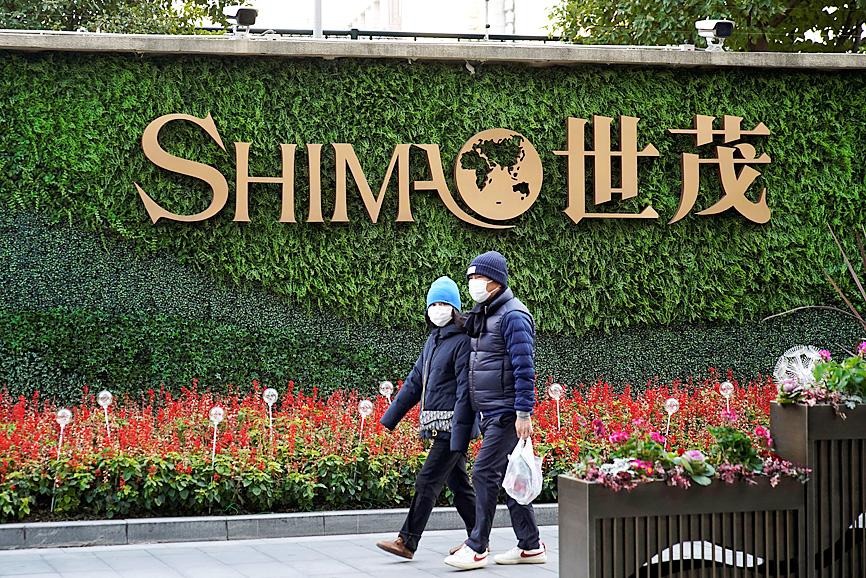AFP, BEIJING
Chinese developer Shimao Group Holdings Ltd (世茂集團) said it has failed to make payment on a US$1 billion bond that matured on Sunday, one of the biggest such defaults so far this year in the country’s troubled property sector.
China’s real-estate sector has been struggling since authorities began a crackdown on excessive debt and rampant consumer speculation in 2020, with giants such as China Evergrande Group (恆大集團) and Sunac China Holdings Ltd (融創中國) scrambling to make payments and renegotiate with creditors.

Photo: Reuters
The crisis has sparked fears that the industry’s struggles could spread to the wider economy, and the latest jolt came on Sunday when Shimao said it had not paid the principal and interest on a US$1 billion offshore note.
In a filing to the Hong Kong Stock Exchange, where it is listed, Shimao said it has experienced a noticeable decline in contracted sales due to “significant changes to the macro environment of the property sector in China since the second half of 2021 and the impact of COVID-19.”
The firm added that it had attempted to negotiate refinancing and waivers, but was unable to make some payments because of “challenging” market conditions.
It said it has not received notice from creditors for accelerated repayment and that lenders have indicated they would not take enforcement action at this point.
Shimao develops residential, hotel, office and commercial properties in China, with projects in major cities such as Beijing and Shanghai.
It was China’s 14th-biggest developer by contracted sales last year, according to Bloomberg News.
China’s developers have been struggling as homebuyers tightened their purse strings owing to an uncertain economic outlook.
One company in the eastern city of Nanjing said it would accept truckloads of watermelons as down payment from local farmers, Chinese media reported.
“The contagion has spread from Evergrande to Sunac and now Shimao,” Bloomberg Intelligence analyst Kristy Hung said. “That raises our concerns that the extent of the debt crisis is beyond any market watcher’s imagination.”

Among the rows of vibrators, rubber torsos and leather harnesses at a Chinese sex toys exhibition in Shanghai this weekend, the beginnings of an artificial intelligence (AI)-driven shift in the industry quietly pulsed. China manufactures about 70 percent of the world’s sex toys, most of it the “hardware” on display at the fair — whether that be technicolor tentacled dildos or hyper-realistic personalized silicone dolls. Yet smart toys have been rising in popularity for some time. Many major European and US brands already offer tech-enhanced products that can enable long-distance love, monitor well-being and even bring people one step closer to

Malaysia’s leader yesterday announced plans to build a massive semiconductor design park, aiming to boost the Southeast Asian nation’s role in the global chip industry. A prominent player in the semiconductor industry for decades, Malaysia accounts for an estimated 13 percent of global back-end manufacturing, according to German tech giant Bosch. Now it wants to go beyond production and emerge as a chip design powerhouse too, Malaysian Prime Minister Anwar Ibrahim said. “I am pleased to announce the largest IC (integrated circuit) Design Park in Southeast Asia, that will house world-class anchor tenants and collaborate with global companies such as Arm [Holdings PLC],”

TRANSFORMATION: Taiwan is now home to the largest Google hardware research and development center outside of the US, thanks to the nation’s economic policies President Tsai Ing-wen (蔡英文) yesterday attended an event marking the opening of Google’s second hardware research and development (R&D) office in Taiwan, which was held at New Taipei City’s Banciao District (板橋). This signals Taiwan’s transformation into the world’s largest Google hardware research and development center outside of the US, validating the nation’s economic policy in the past eight years, she said. The “five plus two” innovative industries policy, “six core strategic industries” initiative and infrastructure projects have grown the national industry and established resilient supply chains that withstood the COVID-19 pandemic, Tsai said. Taiwan has improved investment conditions of the domestic economy

Sales in the retail, and food and beverage sectors last month continued to rise, increasing 0.7 percent and 13.6 percent respectively from a year earlier, setting record highs for the month of March, the Ministry of Economic Affairs said yesterday. Sales in the wholesale sector also grew last month by 4.6 annually, mainly due to the business opportunities for emerging applications related to artificial intelligence (AI) and high-performance computing technologies, the ministry said in a report. The ministry forecast that retail, and food and beverage sales this month would retain their growth momentum as the former would benefit from Tomb Sweeping Day